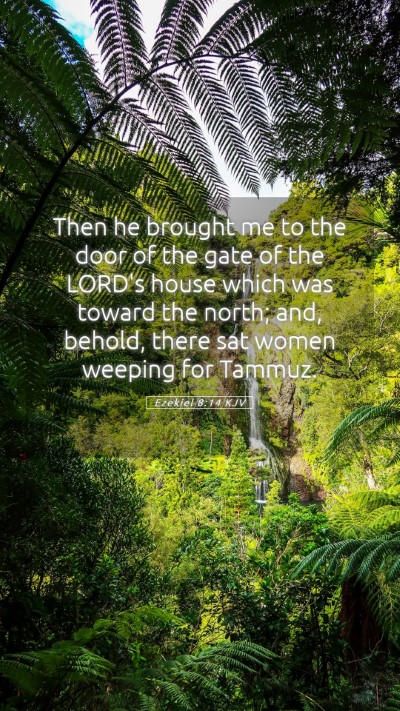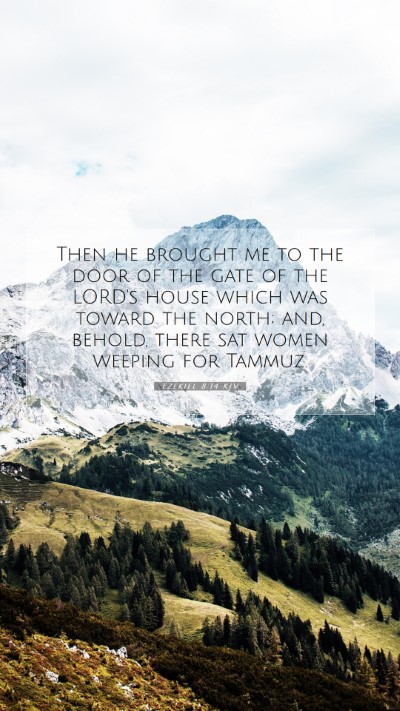Ezekiel 8:14 - Bible Verse Meaning and Commentary
Ezekiel 8:14 states: "Then he brought me to the door of the gate of the Lord's house which was toward the north; and, behold, there sat women weeping for Tammuz."
This verse presents a profound moment where the prophet Ezekiel witnesses idolatrous practices happening in the temple of God. The expression of sorrow by the women for Tammuz illustrates a significant departure from Israel's covenant relationship with Yahweh.
Summary of the Verse
-
Location: The gate of the Lord's house signifies a space intended for worship. The north gate could symbolize the direction from which evil influences were coming.
-
Activity: The women weeping for Tammuz are engaging in a form of mourning that represents attachment to pagan practices.
-
Idolatry: Tammuz was a Babylonian deity associated with fertility and vegetation, highlighting the syncretism that had seeped into Israelite worship.
Commentary Insights
Matthew Henry Commentary
Matthew Henry emphasizes the gravity of seeing God's people engage in acts of idolatry. The weeping for Tammuz represents not just a moment of personal grief but a collective turning away from the true God. Henry notes that the act of mourning for a foreign god indicates a profound spiritual decline, where the Jews adored something that didn't hold true life or power.
Albert Barnes Commentary
Albert Barnes elaborates on the historical and cultural aspects of the worship of Tammuz. He points out that this deity was mourned during a specific agricultural cycle, which the women were likely participating in, demonstrating the deep intertwining of pagan practices within the life of the Israelites. Barnes warns of the consequences of such mingling, as it leads to divine judgment and estrangement from God.
Adam Clarke Commentary
Adam Clarke focuses on the emotional and social implications of the mourning ritual. He highlights how this practice signifies a loss of hope in God's provision and a turn towards human-created solutions for spiritual satisfaction. Clarke stresses the symbolic nature of this event as a call to repentance and a return to true worship.
Understanding the Context
To fully grasp the significance of Ezekiel 8:14, one must understand the historical circumstances surrounding the Israelites during Ezekiel's ministry. At the time, Israel was grappling with exile, a loss of homeland, and a challenge to their identity.
Historical Context: The Babylonian captivity had led many Israelites to adopt foreign customs. The worship of Tammuz reflects an internal struggle — a longing for a semblance of control and hope amid despair.
Application to Modern Life
This passage invites us to reflect on the modern equivalents of idolatry and the distractions that draw us away from God. Just as the Israelites looked for solace in Tammuz, people today may find themselves mourning aspirations, relationships, or pursuits that steer them away from a faithful walk with Christ.
Cross References
- Ezekiel 20:39: God calls His people to serve Him alone, rejecting their idols.
- Jeremiah 44:17-18: References to the worship of the Queen of Heaven and other idols, showing the persistence of idolatry.
- Amos 5:25-26: God criticizes Israel for their offerings and worship to false gods.
Resources for Further Study
For those interested in deepening their understanding of Ezekiel 8:14 and similar passages, a variety of tools and resources are available:
- Bible study groups: Engage with others to discuss interpretations and applications.
- Online Bible study tools: Utilize websites and apps that offer insights and commentary.
- Bible study guides: Reference literature that provides structured lessons.
Understanding Scripture requires an ongoing commitment to study and reflection. Dive deeper into the meaning of Bible verses and explore their historical context, exegesis, and relevance to today’s life.


